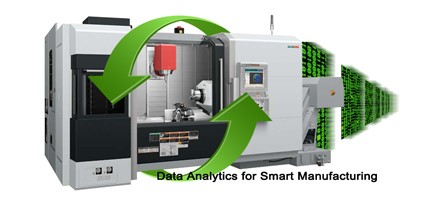

RESEARCH PROGRAM
Title: Data-driven model for energy prediction in precision manufacturing
Name: Raunak Bhinge, PhD
(former student)
Project description:
Starting situation
The ability to accurately predict energy consumption during machining can provide several advantages. For example, energy prediction may be used to estimate energy costs and improve the efficiency of machine tools. This is important since the actual cutting process of a 3-axis CNC machine tool has been found to consume more than 65% of the total machine tool energy consumption. It is also useful to predict energy consumption in response to new regulations and business drivers, such as Smart Grid and carbon cap-and-trade. Finally, energy prediction can enable process monitoring since changes in power demand and energy consumption of machine tools can identify different events and states. Despite their potential in managing and improving machine tool performance, data-driven energy prediction models remain scarce due to the difficulty in systematically measuring energy usage with all machining parameters and input features. However, recent technologies and standards have made it easier to efficiently monitor and manage the machining operation data needed to develop energy prediction models. While prior studies have illustrated the potential of collecting operational and energy consumption data for further analysis, most research dealt primarily with a single operation (e.g., face milling). But, machining a part in practice involves multiple machining operations with different combinations of operational parameters. We aim to develop energy prediction models for the various operations of a computer numerical control (CNC) milling machine using a machine learning approach.
Approach
Using a machine learning approach, we investigate the effects of machining parameters on the energy consumption of a milling machine tool, which would allow selection of optimal operational strategies to machine a part with minimum energy. Data-driven prediction models, built upon a nonlinear regression approach, can be used to gain an understanding of the effects of machining parameters on energy consumption. We use the Gaussian Process to construct the energy prediction model for a computer numerical control (CNC) milling machine tool. Energy prediction models for different machining operations are constructed based on collected data. With the collected data sets, optimum input features for model selection are identified. We demonstrate how the energy prediction models can be used to compare the energy consumption for the different operations and to estimate the total energy usage for machining a generic part. We also present an uncertainty analysis to develop confidence bounds for the prediction model and to provide insight into the vast parameter space and training required to improve the accuracy of the model. Generic parts are machined to test and validate the prediction model constructed using the Gaussian Process.
Expected Results
We expect to develop accurate energy prediction models for 3-axis milling machine tools, turning centers and additive machining centers using the Gaussian Process regression. Once we are able to accurately predict energy consumption patterns in individual manufacturing systems, we will develop extended models to characterize energy-efficient process chains and process planning. A case study from a manufacturing facility in Richmond, California will be used for the implementation and results.


